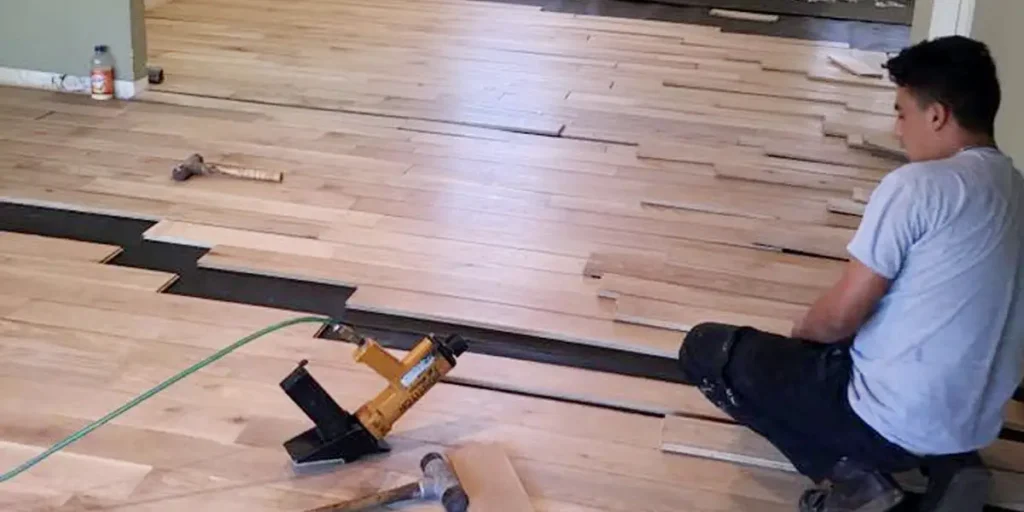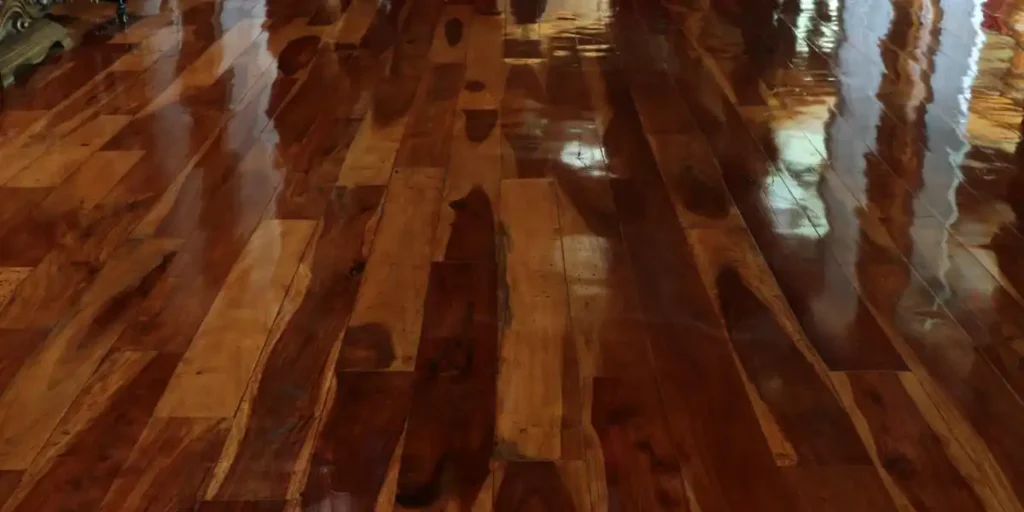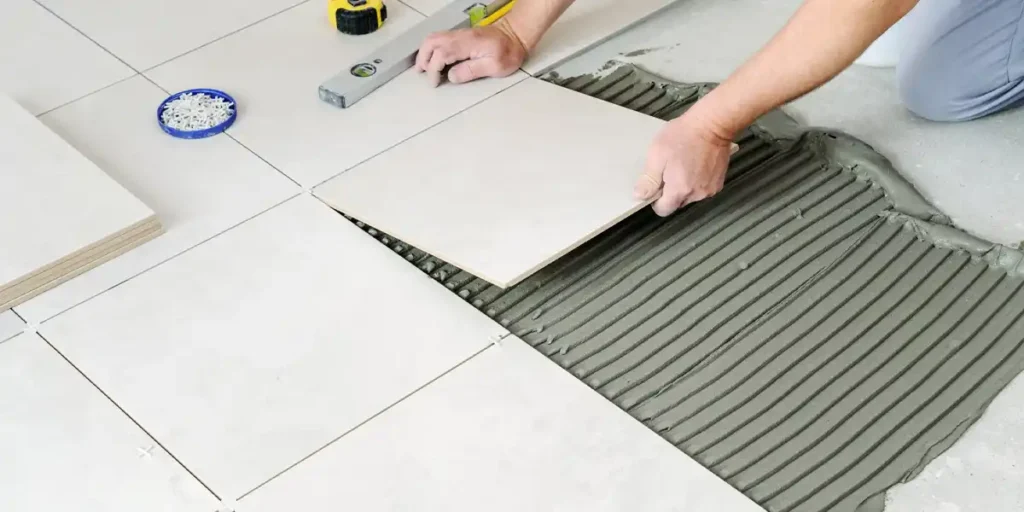Choosing between vinyl and laminate flooring can be daunting. Both options are popular for their affordability, durability, and stylish designs. However, understanding their differences is key to making the right decision for your home or business.
This guide dives deep into the vinyl vs. laminate flooring debate, helping you pick the best option for your needs.
Understanding the Basics: Vinyl vs. Laminate Flooring
What is Vinyl Flooring?
Vinyl flooring is a synthetic material primarily made of polyvinyl chloride (PVC). Its flexible composition makes it highly durable, water-resistant, and versatile.
Key Features of Vinyl Flooring:
- Material: 100% synthetic, with a flexible structure.
- Durability: Resistant to scratches, dents, and stains.
- Water Resistance: Often waterproof, making it ideal for moisture-prone areas.
- Styles Available: Mimics wood, stone, and tile with impressive realism.
Luxury vinyl plank (LVP) and luxury vinyl tile (LVT) options offer enhanced textures and durability, making vinyl a go-to choice for both residential and commercial spaces.
What is Laminate Flooring?
Laminate flooring is a composite material featuring a high-resolution image layer of wood, tile, or stone over a fiberboard core.
Key Features of Laminate Flooring:
- Material: A mix of high-density fiberboard (HDF) and synthetic materials.
- Durability: Scratch-resistant but less water-resistant than vinyl.
- Water Resistance: Can withstand minor spills but prone to warping with prolonged moisture exposure.
- Styles Available: Offers an authentic wood or stone aesthetic at a lower price point than hardwood.
While laminate excels in appearance, it lacks the water resistance that vinyl provides, making it less ideal for kitchens or bathrooms.
Key Differences: A Detailed Comparison
Durability
Vinyl is highly durable, withstanding heavy foot traffic, pet claws, and everyday wear and tear. Luxury vinyl options, in particular, excel in scratch and dent resistance.
Laminate is also durable but slightly less robust than vinyl. It can handle moderate foot traffic and is resistant to light scratches, though it’s less forgiving in high-impact scenarios.
Water Resistance
Water resistance is a defining factor in the vinyl vs. laminate flooring debate. Vinyl wins hands down, with many options being fully waterproof.
Laminate, on the other hand, has limited water resistance. Even water-resistant laminate can warp or swell if exposed to excessive moisture. For kitchens, bathrooms, or basements, vinyl is the safer choice.
Installation
Both vinyl and laminate offer DIY-friendly installation processes, with click-lock systems making it easy to lay planks without glue or nails.
- Vinyl Installation:
Vinyl’s flexible material makes it easier to cut and fit around tricky spaces like corners or fixtures. - Laminate Installation:
Laminate requires a flat subfloor and precise measurements to ensure a proper fit. Mistakes during installation can lead to gaps or unevenness, which may shorten its lifespan.
Maintenance
Maintaining both flooring types is simple, but their cleaning requirements vary slightly:
- Vinyl Maintenance:
Regular sweeping and damp mopping are sufficient. Vinyl is more forgiving of occasional spills and stains. - Laminate Maintenance:
While also easy to clean, laminate requires immediate attention to spills to prevent water damage. Avoid using excessive moisture during cleaning.
Cost Comparison
Both vinyl and laminate are budget-friendly alternatives to hardwood or tile.
- Vinyl Cost:
Entry-level vinyl starts at around $2 per square foot, with luxury options reaching $5–$7. - Laminate Cost:
Laminate prices range from $1.50–$3 for standard options, with premium designs costing up to $5 per square foot.
Aesthetic Appeal
Both vinyl and laminate offer a wide range of designs, but vinyl’s improved texturing gives it an edge in mimicking natural materials like stone or wood. Laminate, while beautiful, tends to have a smoother, less realistic surface.
Making the Right Choice
Your Lifestyle
Your daily activities and household dynamics play a crucial role in determining the best flooring option. If your home is bustling with activity—kids running around, pets scratching floors, or guests frequently visiting—durability becomes a top priority. Vinyl flooring is an excellent choice in such scenarios due to its resilience against scratches, dents, and wear. Its water-resistant nature also makes it forgiving of pet accidents or occasional spills, which are common in busy households.
Your Budget
Budget considerations often dictate flooring decisions, and vinyl and laminate flooring both offer cost-effective alternatives to hardwood or tile. However, laminate flooring typically has a lower upfront cost, making it an appealing option for budget-conscious homeowners. If you’re looking for an affordable solution to revamp a living room or bedroom, laminate can deliver a stylish and cost-effective result.
Your Space
The location and function of the space you’re renovating also matter greatly. Vinyl flooring excels in moisture-prone areas like bathrooms, kitchens, or basements, where spills or humidity are common. Its water resistance provides peace of mind and longevity in such spaces.
Your Style Preferences
Finally, your personal aesthetic preferences will play a big role. Both vinyl and laminate offer stunning designs that mimic natural wood or stone. However, vinyl often edges ahead with its textured finishes, providing a more realistic tactile experience. Laminate flooring, though, can offer a sleek, polished look that some homeowners prefer for a modern vibe.
Conclusion
Choosing between vinyl and laminate flooring ultimately depends on your priorities. Whether you value water resistance, budget, or aesthetics, understanding the differences between vinyl and laminate flooring will help you make an informed choice. Both are excellent options for creating a stylish, durable, and budget-friendly space.
Ready to transform your floors? Contact Cardenas Flooring for expert advice, top-quality materials, and professional installation services tailored to your needs.
FAQs (Frequently Asked Questions)
1. Which is better, laminate or vinyl flooring?
Both have advantages, but vinyl flooring is better for moisture-prone areas since it is waterproof. Laminate flooring has a more natural wood feel.
2. Which flooring looks more natural, vinyl or laminate?
Laminate flooring looks more natural due to its high-resolution wood grain patterns and textured surface, which closely mimic real hardwood.
3. Which flooring is better for resale value, vinyl or laminate?
Luxury Vinyl Plank (LVP) is generally preferred for resale due to its waterproof properties, durability, and modern appeal. However, high-quality laminate can also add value, especially if it closely resembles real wood.
4. Is vinyl flooring suitable for the entire house?
Yes, vinyl flooring is a great option for the entire house, including kitchens, bathrooms, and living areas. It is waterproof, durable, and easy to maintain, making it a practical choice for high-traffic homes.
5. What are the disadvantages of vinyl flooring?
Some downsides of vinyl flooring include the following:
- Difficult to remove if glued down.
- Some types may emit VOC fumes, affecting indoor air quality.
- Less comfortable than laminate or hardwood.
- It can fade with prolonged UV exposure.
6. Does vinyl flooring crack easily?
No, vinyl flooring does not crack easily.




